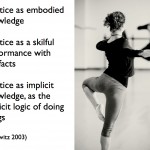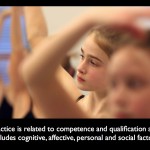A number of years ago I did a couple of studies, funded by the European Commission on the use of technology for learning in Small and Medium Enterprises (SMEs). SMEs are defined by the European Commission as those employing less than 350 employees. My overall conclusions were that whilst few enterprises were using Virtual Learning Environments or indeed any other formal e-learning platforms or technologies for learning this did not mean that learning was not happening. Instead many employees used computers everyday for informal learning. Learning was motivated by the need to solve problems in the workplace or surprisingly often by curiosity and interest.
The technologies employed varied but they included Google, Bulletin Boards and email. Ask-a-friend was a common pedagogic strategy.
Now several years on, the European Commission’s Research Programme on information technologies has launched another call for projects designed to crack the perceived issue of the lack of use of Technology Enhanced Learning in SMEs.
And they still haven’t got it. They seem to have an assumption that there are hard to reach sectors or that the technology just isn’t good enough. Or, often is cited, the lack of access to hardware and connectivity.
Of course, since I did my orginal study, there has been considerable changes in technology. The biggest is probably the widespread use of mobiles, (handys, GSM, cells), many of them internet enabled.
But talking to employers this week I don’t see many changes in how the internet is being used for learning. There is one big change though. The employers I have spoken to are aware that computers can facilitate learning and knowledge exchange and support those processes. Back before few employers even knew their employees were involved in learning (mind, many of the employees also didn’t call it learning!).
but the learning processes remain informal. Human communication is most valued, albeit technology mediated. There remains little take up of formal e-learning programmes.
There does seem to be an increasing awareness of the need to link learning and information and knowledge management processes. There is also intense interest in the ability of new technologies to be utlisied at or near the work process and to support the development of what I call work process knowledge or developmental competence.
The concept of Work Process Knowledge emphasises the relevance of practice in the workplace and is related to concepts of competence and qualification that stress the idea that learning processes not only include cognitive, but also affective, personal and social factors. They include the relevance of such non-cognitive and affective-social factors for the acquisition and use of work process knowledge in practical action. Work often takes place, and is carried out, in different circumstances and contexts. Therefore, it is necessary for the individual to acquire and demonstrate a certain capacity to reflect and act on the task (system) and the wider work environment in order to adapt, act and shape it. Such competence is captured in the notion of “developmental competence” (Ellstroem PE, 1997) and includes ‘the idea of social shaping of work and technology as a principle of vocational education and training’ (Heidegger, G., Rauner F., 1997). Work process knowledge embraces ‘developmental competence’, the developmental perspective emphasising that individuals have the capacity to reflect and act upon the environment and thereby forming or shaping it. In using technologies to develop such work process knowledge, individuals are also shaping or appropriating technologies, often developed or designed for different purposes, for social learning.
it seems to me that if we really want to introduce Technology Enhanced Learning in the workplace (and especially in SMEs) we have to find ways of supporting the development of work process knowledge and developmental competence. The problem is that most formal elearning programmes are tied to very traditional notions of competences, which are often only loosely connected to practice. This is one of the reasons I like the idea of rhizomatic knowledge, as put forward by Dave Cormier and currently being discussed on the #Change11 MOOC. Rhizomatic knowledge in the sense of work process knowledge is generated by practice in communities and technology can be used to scaffold the development of developmental competence through practice (incidentally I think this overcomes many of the objections to the idea of rhizomatic knowledge as discussed on Dave’s blog).


